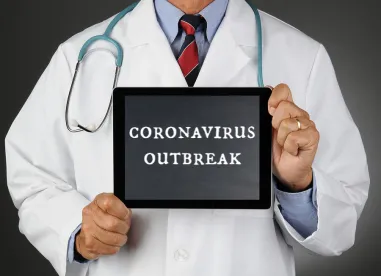On March 24, 2020, the US Federal Trade Commission (FTC) and US Department of Justice (DOJ) issued a Joint Antitrust Statement Regarding COVID-19. In this statement, the FTC and DOJ recognize that public health efforts in response to the Coronavirus (COVID-19) require government and private cooperation. To address the speed at which companies and individuals must engage in COVID-19 response activities, the FTC and DOJ will respond to COVID-19-related requests for advisory opinions and business review letters within an expedited seven days of receipt of all information.
IN DEPTH
On March 24, 2020, the US Federal Trade Commission (FTC) and US Department of Justice (DOJ) issued a Joint Antitrust Statement Regarding COVID-19. In this statement, the FTC and DOJ recognize that public health efforts in response to the Coronavirus (COVID-19) require government and private cooperation. Many forms of pro-competitive collaborations do not violate the antitrust laws, as recognized in existing FTC/DOJ guidance, such as the Antitrust Guidelines for Collaborations Among Competitors and the Statements of Antitrust Enforcement Policy in Health Care. However, the FTC and DOJ state that they are prepared to pursue civil violations of the antitrust laws for agreements “between individuals and business to restrain competition through increased prices, lower wages, decreased output, or reduced quality as well as efforts by monopolists to use their market power to engage in exclusionary conduct.” DOJ also has the power to prosecute criminal violations of the antitrust laws.
Companies and individuals considering coordinating conduct in response to COVID-19 should review, as a threshold question, the purpose of the proposed competitor collaboration. Pro-competitive purposes include increasing access to healthcare services or supplies, improving the quality of care and reducing unnecessary costs of healthcare. Anti-competitive purposes include decreasing output, access and quality, and increasing healthcare costs.
The nature and extent of the parties’ combination of resources, intended pro-competitive efficiencies, and potential competitive effects of the collaboration in the relevant product and geographic markets in which the parties compete should also be considered. As this analysis often depends on all relevant facts and circumstances, the FTC has an existing advisory opinion process and the DOJ has an existing business review letter process for parties to request federal antitrust enforcement agency views on proposed conduct. Those processes can take many months after submission of all initial and follow-up requests for information, however.
To address the speed at which companies and individuals must engage in COVID-19 response activities, the statement provides that DOJ and FTC staff will respond to COVID-19-related requests within an expedited seven days of receipt of all information. A successful review will provide a statement of the government’s present enforcement intention related to the proposed arrangement, and can therefore provide significant comfort, although it is not antitrust immunity.
FTC/DOJ Guidance on Activity Unlikely to Raise Antitrust Concerns
The following is an overview of the antitrust framework for several types of joint activities that individuals and business may undertake in response to COVID-19.
Research and Development
The agencies reiterate their prior guidance that “when firms collaborate on research and development this ‘efficiency-enhancing integration of economic activity’ is typically procompetitive.”
Sharing General “Know-How” and Clinical Best Practices
Parties may continue to share technical “know-how,” clinical best practices and other similar information to combat COVID-19. For example, healthcare providers may continue to collect and share clinical outcome data and suggested practice parameters to develop protocols or otherwise increase quality and efficiency.
Joint Purchasing Arrangements
The FTC and DOJ recognize that many joint purchasing arrangements among hospitals or other healthcare providers do not raise antitrust concerns as they are designed to achieve efficiencies (i.e., cost-savings) that should benefit consumers. An antitrust safety zone provides that the FTC and DOJ will not challenge, absent extraordinary circumstances, any joint purchasing arrangement among healthcare providers where two conditions are present:
-
The purchases account for less than 35% of the total sales of the purchased product or service in the relevant market.
-
The cost of the products and services purchased jointly accounts for less than 20% of the total revenues from all products or services sold by each competing participant in the joint purchasing arrangement.
Emergency Measures and Government Collaboration
If competitors are contemplating measures that may involve conduct that would be viewed as anti-competitive under normal circumstances, but which they believe is necessary to support the government’s COVID-19 efforts (for example, coordinating behavior to help healthcare providers receive critical supplies), the conduct still may be possible under certain emergency government powers. For example, both the Defense Production Act of 1950 and the Pandemic and All-Hazards Preparedness Act (PAHPA) provide antitrust immunity for agreements made under the supervision of, and in cooperation with, the federal government. The DOJ and FTC are ready to assist where parties are working with the Federal Emergency Management Agency, the US Department of Health and Human Services, or other government agencies to pursue such agreements.
Parties also may petition the government or jointly engage in lobbying efforts under Noerr-Pennington. An example in the current circumstances may include “private industry meetings with the federal government to discuss strategies on responding to COVID-19” or to solicit the government to act. These rights to petition and lobby the government remain untouched in the current circumstances.
Finally, the agencies stated that they will process filings expeditiously that are made under the National Cooperative Research and Production Act. This act applies to certain joint ventures for research and development or production, as well as standards development organizations. The act remains unaffected, but the agencies indicated that they will review submissions more quickly.





 />i
/>i

